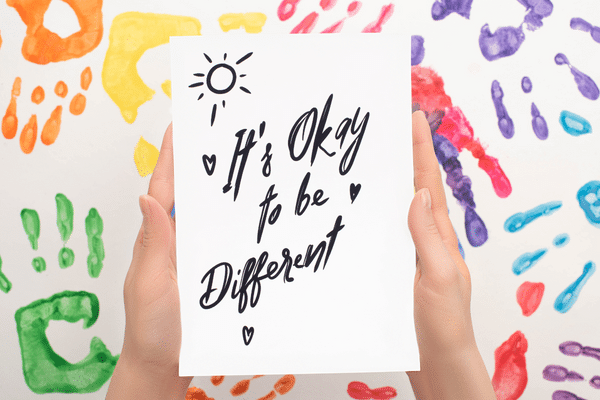.png)
Neuroinclusive Recruitment: How to Attract and Support Neurodiverse Talent
There are obstacles in typical recruitment processes that may place neurodivergent candidates at a disadvantage. But what is neuroinclusive recruitment? We take a closer look at the unintentional barriers that may be preventing you from tapping into the neurodiverse talent pool.
Understanding Neurodivergent Conditions in the Workplace
Over the last couple of years, there has been an increased awareness of neurodiversity. Celebrities and social media influencers have spoken about the challenges they face and how getting the right diagnosis and support has helped them function in a world built for the neurotypical brain. Neurodiversity is a term that covers a wide range of conditions, including but not limited to:
Autism, including Asperger’s Syndrome.
Attention Deficit Hyperactivity Disorder (ADHD)
Dyslexia
Dyspraxia (Developmental Coordination Disorder DCD)
Dyscalculia
Dysgraphia
Tourette’s Syndrome
Obsessive-Compulsive Disorder (OCD)
Synesthesia

It is estimated that more than 15% of people in the UK are neurodivergent*. This means that the brain functions, learns, and processes information differently. 1 in 20 adults in the UK is estimated to have attention deficit hyperactivity disorder (ADHD) with only 120,000 formally diagnosed. It is also estimated that 1 in 100 people in the UK is autistic with around 120,000 people waiting for an assessment in the UK alone.
Diagnosis is often delayed by years through long waiting times or viewed as a mental health disorder. Many are misdiagnosed and treated for secondary symptoms such as depression, bipolar, or anxiety disorders. Neuroimaging studies have shown that there are structural differences in neurodiverse brains. They are literally wired differently. It is a disability; and a protected characteristic of the Equal Opportunities Act 2010**.
Why Neurodiversity is a Competitive Advantage for Employers
'There are some shocking statistics about the sheer lack of neurodiverse people in the UK workforce. That is nothing to do with people receiving a diagnosis; it has everything to do with the fact that we are wasting that opportunity....'Elliot Colburn
Research shows that having neurodiverse people in the workplace adds value. Different minds can approach tasks in different ways, find different solutions, and see things from new perspectives. They can challenge the status quo, often for the better, and make the business more productive and innovative. Neurodiversity is exactly what the workforce needs.
With NHS waiting lists now running into years, Parliament held a debate on ADHD & Autism support in the UK in February 2023. Whilst the issues raised won’t be solved overnight, they are being discussed by Government. In the meantime, there are steps that businesses can take right now to make reasonable adjustments.
A lack of understanding of neurodiversity means many employers see hiring people with neurodevelopmental conditions to be a challenge rather than an opportunity. A neuroinclusive workplace can enjoy the creativity, problem-solving skills, and imaginative thinking that talent who think differently can bring.
Neuroinclusive recruitment allows you to seize the opportunity and recruit from the untapped talent pool of neurodiversity.

How to Make Your Recruitment Process Neuroinclusive
A lack of understanding of neurodiversity means many employers see hiring people with neurodevelopmental conditions as a challenge rather than an opportunity. A neuroinclusive workplace can enjoy the creativity, problem-solving skills, and imaginative thinking that talent who think differently can bring.
Recruitment processes are typically designed for the neurotypical. Neurodivergents may not be aware they have a disability. It could be sitting there undiagnosed. Or they chose not to reveal this because of the stigma associated with it or a previous poor experience.
Many neurodivergents know their own trigger points and have good coping strategies. The difficulties often only become unmanageable when their environment changes. And what greater change in environment than a job interview, or starting a new job?
Employers would make adjustments for someone with a physical disability. Not all disabilities are visible, but they do need the same level of consideration. Neuroinclusive recruitment allows you to seize the opportunity and recruit from the untapped talent pool of neurodiversity. We look at ways to adapt the recruitment process to be neuroinclusive.
Attraction
Consider the message you convey to candidates on your website, job boards, and social media. Make it clear that your organisation welcomes applications from those who think differently and that you are flexible to cater to neurodiverse talent. Neurodivergents will generally know what adaptations they need in certain situations, but the language you use may prevent them from sharing this.
Write inclusive job adverts, avoiding language that could be confusing or deter someone from applying. Move away from words such as flexible, multitasker, or social skills.
Ensure your recruitment process is transparent with clear milestones throughout i.e. closing date for applications, interview or assessment centres, and start date – this is good practice.
Recruitment open days can be a great way to engage with active job seekers or those who are particularly interested in working for your business. However, they can be loud and busy which can be distressing for someone with a neurodiverse condition. In a similar way that the leading supermarkets have done, consider advertising a ‘neurodiverse hour'. This demonstrates your commitment to neuroinclusive recruitment.
Selection
The selection process for a neurodiverse person requires a different way of understanding so give all candidates a level playing field. Those who think differently from neurotypical brains may need a different approach to bringing their best self to an interview. Considerations could include:
Will the interview style consist of competency-based questions?
Will they need to complete dexterity, literacy, or numeracy tests?
Give candidates the best chance of succeeding at the interview by giving them advance notice of what to expect so they don’t receive any surprises.
Consider alternative methods of assessing a candidate’s suitability for the role and remove unconscious barriers. If you have a job that relies on creativity and visual skills, don't only use a verbal recruitment technique. A person with autism may not bring their best self to a face-to-face interview situation, so what about offering a video interview or work trial to test their skills instead?
The Hiring Manager

It is important that the hiring manager or anyone involved in the interview process has an understanding of neurodiversity. Whilst no two people are the same, an awareness of the common traits or characteristics will help them to adapt their interview style.
Behaviours that don’t meet neurotypical expectations may conjure up “red flags”. With an understanding of neurodiversity the hiring manager is better equipped to consider the underlying reasons for those red flags. For example, a person with ADHD may have had many jobs and so perceived as a ‘job-hopper’. Could there be a legitimate reason why they’ve moved jobs so often?
Was this before they received their diagnosis? Was it because they worked in an environment that only catered to the neurotypical?
The Interview
Many people with ADHD, Dyslexia, and Dyspraxia have difficulties with their ‘working memory’. By struggling to recall information, it may appear that the person does not know the answer. In fact, all they need is more time to think.
Situational judgment tests may put someone with a neurodiverse condition at a disadvantage as they struggle to imagine a situation they have not actually been in.
People on the ADHD and autistic spectrum rarely lie or exaggerate. Compare this to a neurotypical person at an interview who can embellish their achievements and the neurodivergent may be at a disadvantage for their honesty.
It may seem that a candidate is disinterested in the role if they struggle to maintain eye contact throughout the interview. Is eye contact a requirement of the role or are they talking to customers on the phone? And do they appear blunt or matter-of-fact? It takes a lot of confidence for someone on the autistic spectrum to engage in a challenging social situation.
Neuroinclusive Culture

If neurodiverse candidates have a positive experience regardless of the outcome of your recruitment process, they are likely to tell others about it and your future talent pool will become wider. But remember, even if your recruitment process has been welcoming and neuroinclusive, this does not necessarily extend to the onboarding process, so it is important to evolve each stage of the recruitment journey to foster a neuroinclusive culture where everyone feels they belong.
Still have questions about neuroinclusive recruitment? Here are some of the most common questions we get from employers looking to improve their hiring processes.
Frequently Asked Questions (FAQs)
What is neuroinclusive recruitment?
Neuroinclusive recruitment ensures that hiring processes are accessible and fair to neurodiverse candidates by removing hidden barriers.How can employers make their recruitment process more neuroinclusive?
Employers can implement clear job descriptions, provide interview accommodations, and train hiring managers on neurodiversity awareness.Why is hiring neurodiverse talent important?
Neurodiverse employees bring unique strengths such as creativity, problem-solving, and innovation that can benefit any business.
Unlock the Power of Neuroinclusive Recruitment
As members of the Recruitment & Employment Confederation (REC) and APSCo Outsource, Greenbean is experienced in the design and implementation of inclusive recruitment practices. We challenge established recruitment practices specifically for the contact centre industry that unlock access to a wider talent pool.
Unintended barriers in your recruitment process could be preventing you from accessing a wealth of untapped neurodiverse talent. By embedding inclusive recruitment language and practices, you can create a hiring process that welcomes and supports candidates who think differently—enhancing your organisation’s innovation, creativity, and problem-solving capabilities.
At Greenbean, we specialise in Recruitment Process Diagnostic & Design, helping businesses optimise their hiring strategies to be more inclusive, efficient, and effective.
Book Your FREE Consultation Today!
Unlock the potential of neurodiverse talent in your organisation! Book a FREE consultation today to optimise your recruitment process and build an inclusive workplace that attracts top neurodiverse candidates. Complete the form below and we'll be in touch shortly!
